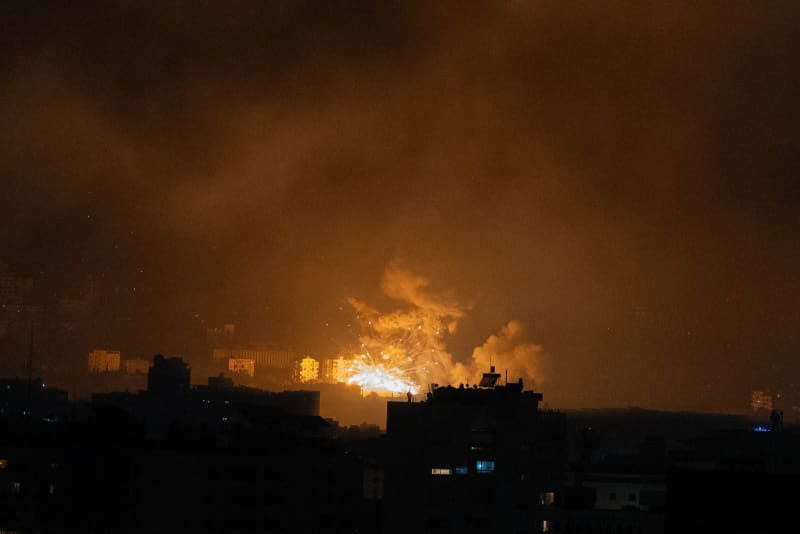The Lebanese militant group Hezbollah confirmed on Saturday that its long-time leader, Hassan Nasrallah, was killed in an Israeli strike on a suburb of Beirut.
The killing of the 64-year-old Nasrallah, a cleric who has lead Hezbollah for more than 30 years and built the Lebanese militant group into a powerful force, is one of the heaviest blows ever dealt by Israel to Hezbollah.
Under Nasrallah’s leadership, the Shiite organization built huge political influence in Lebanon as well as a military arm that is considered a significant force in the region. He also helped forge close ties with Iran’s Islamic Revolutionary Guard Corps, the group’s most important backer and supplier.
Hezbollah called Nasrallah “a great martyr” and said he was killed in a “treacherous Zionist” attack on Friday.
The Iran-backed Shiite movement pledged “to continue its jihad in confronting the enemy, in support of Gaza and Palestine, and in defence of Lebanon and its steadfast and honourable people.”
The group did not immediately comment on who would succeed Nasrallah.
Shortly after Hezbollah made the announcement, heavy gunshots into the air could be heard around Beirut, particularly in suburbs that are controlled by Hezbollah.
Shiite militia supporters drove through the city in cars and scooters with Hezbollah flags and images of Nasrallah.
The Israel Defense Forces (IDF) first announced Nasrallah’s death, claiming that he was killed alongside senior Hezbollah commanders in an Israeli airstrike on a Hezbollah complex on Friday.
“Hassan Nasrallah will no longer be able to terrorize the world,” the IDF wrote in a post on social media platform X.
The Hezbollah commander responsible for southern Lebanon, Ali Karaki, was also killed, alongside other high-ranking commanders, it said.
In parts of Beirut, crowds gathered clad in black for mourning after Nasrallah’s death was announced. One women was hitting her head in grief, screaming “our pillar has died,” as scores of journalists filmed the crowds.
“There was one Nasrallah but now all of us are Nasrallah,” one man said.
The southern suburbs of Beirut, meanwhile, were largely deserted as most residents have fled from heavy Israeli airstrikes that have targeted the area.
It is difficult to predict how Hezbollah might respond, or what the consequences for the ongoing conflict with Israel and the broader region might be.
Fears that mutual attacks between Israel and Hezbollah could escalate into an all-out war have been rising since Israel launched a massive aerial campaign on Hezbollah targets across Lebanon on Monday, killing hundreds of people so far.
Iran’s Supreme Leader Ali Khamenei described Hezbollah as “unconquerable” in remarks on Saturday but did not directly address reports of Nasrallah’s death.
“The criminal Zionists (Israelis) should know that they are incapable of damaging the stable structure of Hezbollah as the leader of the resistance front,” Khamenei said, according to the IRNA state news agency.
Hezbollah continued to attack Israel on Saturday, taking responsibility for several missile attacks and artillery shelling on the neighbouring country.
Meanwhile, Israel also continued its attacks on Lebanon overnight and during the day on Saturday, with reports of new airstrikes hitting the southern suburbs of Beirut in the afternoon.
The IDF said Friday’s attack that killed Nasrallah targeted a Hezbollah headquarters said to have been located underneath residential buildings.
After the attack in the neighbourhood of Haret Hreik near the airport, thick clouds of smoke could be seen, followed by large piles of rubble.
According to the Lebanese Health Ministry, at least six people were killed and 91 injured in the attack. However the death toll is expected to rise further as several buildings were completely destroyed, according to state media.
Israel’s military chief issued a threat to other enemies of the country shortly after announcing the death of Nasrallah.
“The message to all those who threaten the citizens of the state of Israel is simple: we will know how to reach them. In the north, in the south and in more distant places,” Israel’s Chief of General Staff Herzi Halevi said.
He said that the attack on Friday had been prepared for a long time.
“It came at the right time and in a very sharp manner,” Halevi said.
Nasrallah joined Hezbollah, which means “the party of god,” in 1982. Following the Israeli assassination of his predecessor, Abbas al-Mussawi, in 1992, he became the group’s leader.
He saw the withdrawal of Israeli troops from southern Lebanon in 2000, which had been occupied since 1982, and also led Hezbollah through the 2006 Israeli invasion, which he described as a “divine victory” for his forces.
Hezbollah has also been hit hard by massive strikes by Israel in recent weeks. It has been significantly weakened in terms of its leadership, its means of communication and probably also its fighting morale.
Pagers and radios used by Hezbollah fighters exploded in a series of coordinated attacks earlier this month believed to have been carried out by Israel, which killed dozens and left thousands injured.









